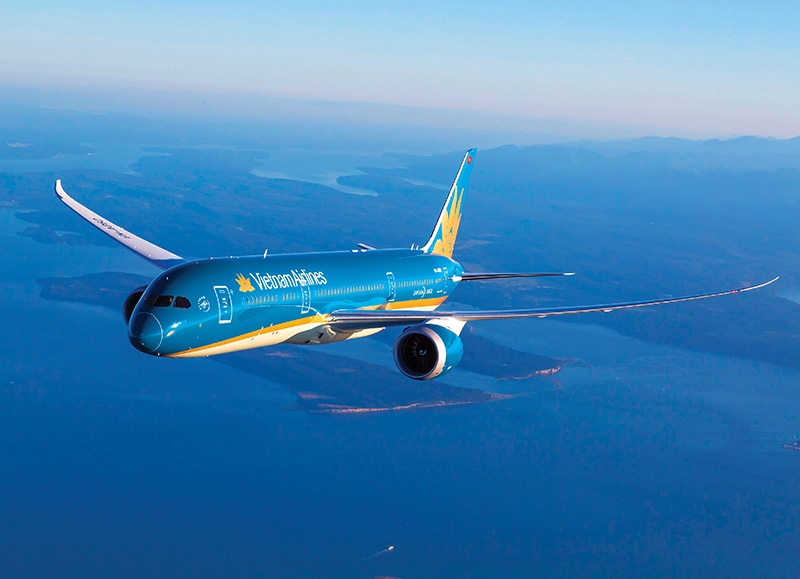Vietnam Airlines clings on to hope of government support
 |
| Vietnam Airlines is requesting special assistance from the state Photo: Le Toan |
Taking office as newly-elected chairman of Vietnam Airlines in a historically difficult period, Dang Ngoc Hoa’s face has been full of anxiety because of the increasing responsibility in helping the country’s leading wings recover from a tough year.
“The first thing that I did as the new chairman was to encourage our staff to move ahead. We already have different scenarios for future developments of the pandemic,” Hoa said. “Necessary measures and solutions have been taken, including cost-saving, restructuring the aircraft fleet, and more.”
However, the national flag carrier believed it cannot recover without strong support from the government. Vietnam Airlines, at the general shareholder meeting on August 10, officially sought future solutions, with financial support of VND12 trillion ($521.7 million) being a focus.
| Dang Ngoc Hoa - Newly-elected chairman, Vietnam Airlines
The improvement of core business activities is the key task now. Specifically, we will practice thrift, increase labour productivity, and streamline the apparatus as requested by the government, as well as intrinsic requirements. The most important task for Vietnam Airlines is to ensure absolute safety for operation of the group, as well as of passengers. Leaders volunteer to not get a salary, and we arrange aircraft for cargo transportation instead of for passenger transport. With the unpredictable development of the pandemic, all scenarios should be prepared, but we believe we will overcome the difficulties, recover, and develop sustainably in the future. |
The group proposes the state, which holds a controlling stake of 86 per cent, to issue special supporting policies. The airline has so far submitted 15 documents to authorised agencies in this regard.
“The government has asked the Commission for the Management of State Capital at Enterprises (CMSEC) to work with Vietnam Airlines on the completion and submission of necessary procedures to the highest Vietnamese authorities (the National Assembly/Politburo) in order to decide the supporting policies, with the additional loan of VND4 trillion ($173.9 million) from the state and an increase of equity by VND8 trillion ($347.8 million) being the key solution,” Pham Ngoc Minh, former chairman of Vietnam Airlines, said.
Industry insiders said that the aviation sector is in urgent need of special supporting policies to soon deal with the difficulties. Senior economist Tran Dinh Thien said that legal barriers that could delay the issuance of the policies could make the situation more serious. “In some cases, the policies were issued when businesses were exhausted, or lost the opportunities to recover.”
Nguyen Hong Hien, representative from the CMSEC noted that shareholders, especially strategic stakeholders and state agencies, should urgently work together to help the airline overcome the crisis, keep growing, and increase investment value for shareholders.
The time that the government will take in making moves will be decisive for Vietnam Airlines. Without the government support, Vietnam Airlines may not be able to hold out for long, depending on the time to control of the pandemic both at home and abroad. Meanwhile, the International Air Transport Association (IATA) forecast that the international aviation market is not likely to bounce back until 2024, meaning severe difficulties ahead for airlines.
Vietnam Airlines plays an important role in the domestic aviation sector, which greatly contributes to the country’s GDP. The group, which includes Vietnam Airlines, Pacific Airlines, and VASCO, holds a total domestic market share of 50 per cent.
The air transport industry, including airlines and its supply chain, is estimated to support $2.6 billion of GDP in Vietnam, while spending by foreign tourists supports a further $9.9 billion of the country’s GDP, totalling $12.5 billion.
Looking ahead, air transport in Vietnam is forecast to grow by 178 per cent in the next 20 years under the “current trends” scenario. This would result in an additional 82.2 million passenger departures by 2038. If met, this increased demand would support approximately $35 billion of GDP and around 2.4 million jobs.
In spite of the importance, Vietnam Airlines is still waiting for the long-awaited support while regional giants have received some funds. In particular, Vietnam Airlines’ Japanese strategic partner ANA attained funding of $10 billion, Singapore Airlines was offered support of $13 billion, Malaysia Airways received a loan of $1.2 billion, and Thai Airways was given $1.8 billion in support.
The Hanoi-based carrier has taken a number of measures to keep its footing. In the short-term the giant is focused on cargo transport, chartered flights, and cutting costs. In the long term, it plans to restructure its aircraft fleet.
“We have negotiated to delay new aircraft purchases and rent deals and even cancelled unnecessary ones. We will sell the long-used aircraft and divest investment from subsidiaries, joint ventures, and associated companies,” said Duong Tri Thanh, CEO of Vietnam Airlines.
The national flag carrier has suffered its largest-ever loss. In the first six months of 2020, it made revenues of VND24.8 trillion ($1.07 billion), down 50 per cent on-year, and incurred after-tax losses of VND6.64 trillion ($288.7 million).
To maintain operations, the airline increased long-term loans from VND5 trillion ($217.4 million) to VND9 trillion ($391.3 million) while negotiating with lenders to extend the payment period.
Worse still, the new recent COVID-19 infection cases have crushed hopes of a possible recovery for the domestic market this summer. In July, when the country reported no new cases, Vietnam Airlines conducted 500 domestic flights daily, up 40 per cent on-year. However, since late July ,the number fell to 109 flights a day, a similar fall to that in May.
In the wake of the adversity, Vietnam Airlines expects to make consolidated revenues of VND40.58 trillion ($1.76 billion) in 2020, down 60 per cent on-year, and after-tax losses of VND15.17 trillion ($659.56 million), with a plan to announce no dividend payouts in 2019.
What the stars mean:
★ Poor ★ ★ Promising ★★★ Good ★★★★ Very good ★★★★★ Exceptional
 Tag:
Tag:
Themes: COVID-19
- 67 million children missed out on vaccines because of Covid: UNICEF
- Vietnam records 305 COVID-19 cases on October 30
- 671 new COVID-19 cases recorded on October 1
- Vietnam logs additional 2,287 COVID-19 cases on Sept. 21
- People’s support decisive to vaccination coverage expansion: official
Related Contents
Latest News
More News
- Ho Chi Minh City hits $8.37 billion in FDI (December 29, 2025 | 08:28)
- Tax sector wraps up 2025 and sets priorities for next year (December 25, 2025 | 14:00)
- Heavy industries set for pilot greenhouse gas quotas (December 25, 2025 | 10:00)
- $250 million deal targets women-owned SMEs, sustainable agriculture (December 22, 2025 | 17:40)
- UOB sees Vietnam growth easing in fourth quarter (December 22, 2025 | 17:39)
- Government moves to establish International Financial Centre (December 21, 2025 | 21:00)
- Vietnam's IFC to target global investment flows (December 21, 2025 | 18:00)
- Ha Tinh breaks ground on major Vingroup industrial and energy projects (December 19, 2025 | 18:24)
- EVN launches major power infrastructure projects nationwide (December 19, 2025 | 18:17)
- VAL inaugurates second production line to meet domestic animal feed demand (December 19, 2025 | 16:37)
























 Mobile Version
Mobile Version